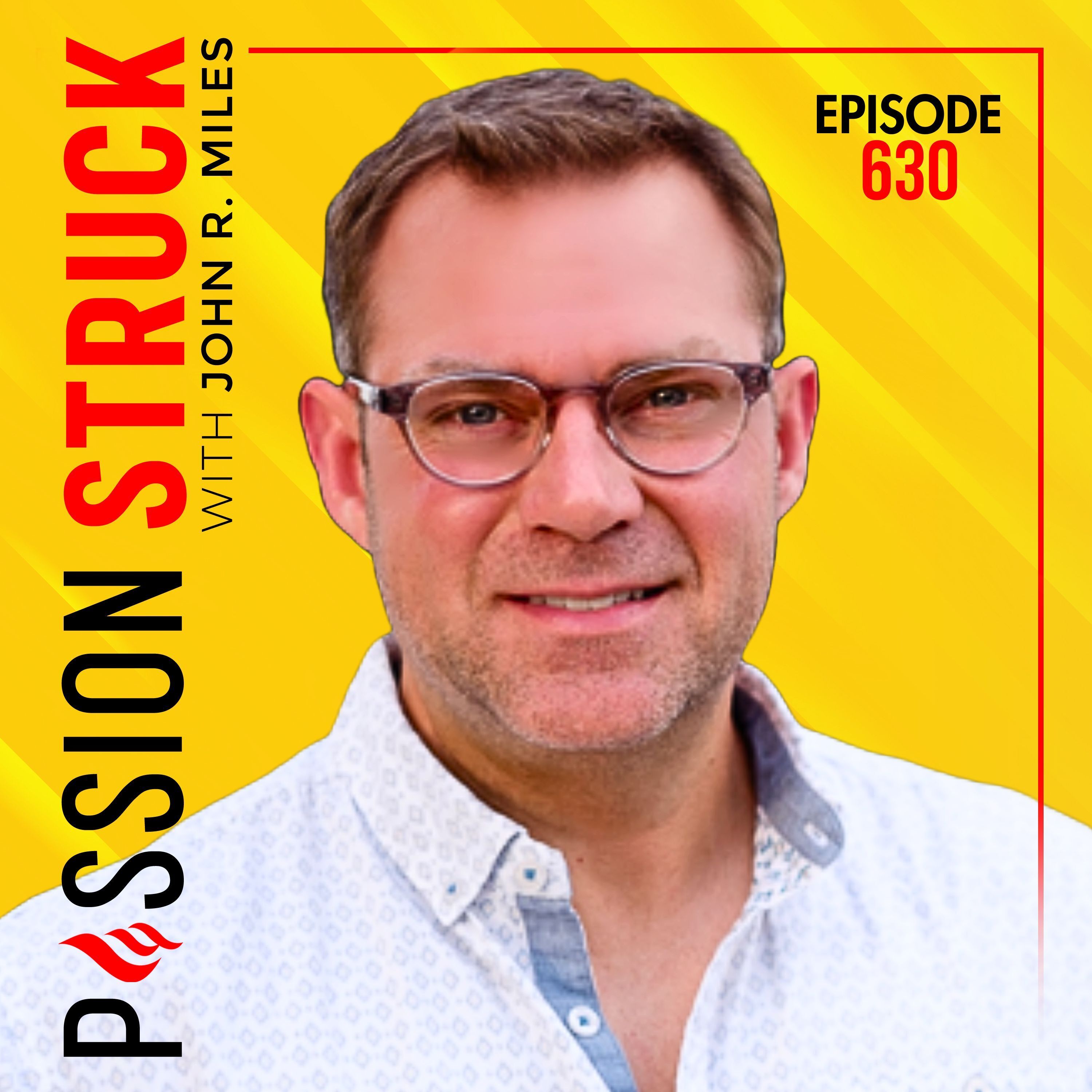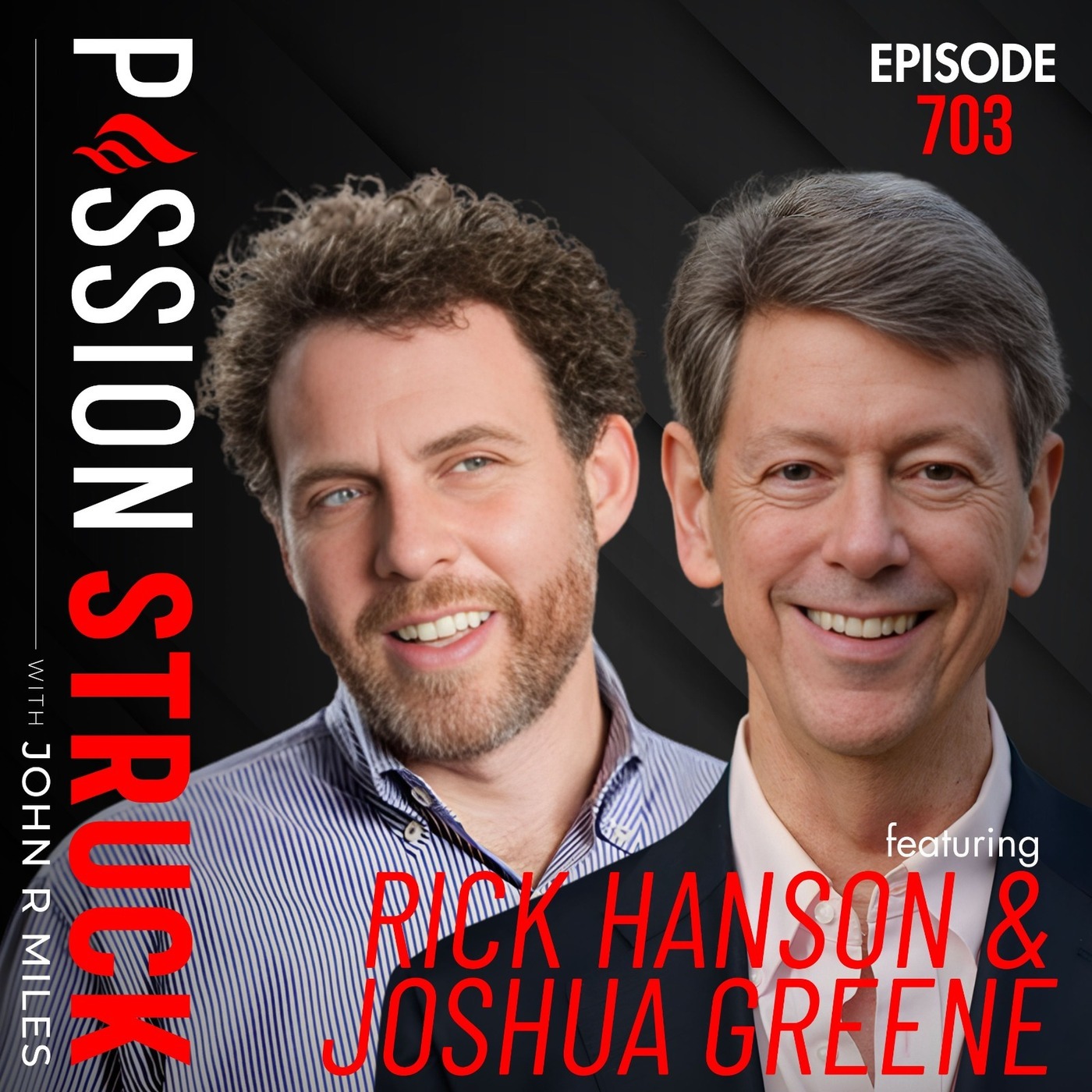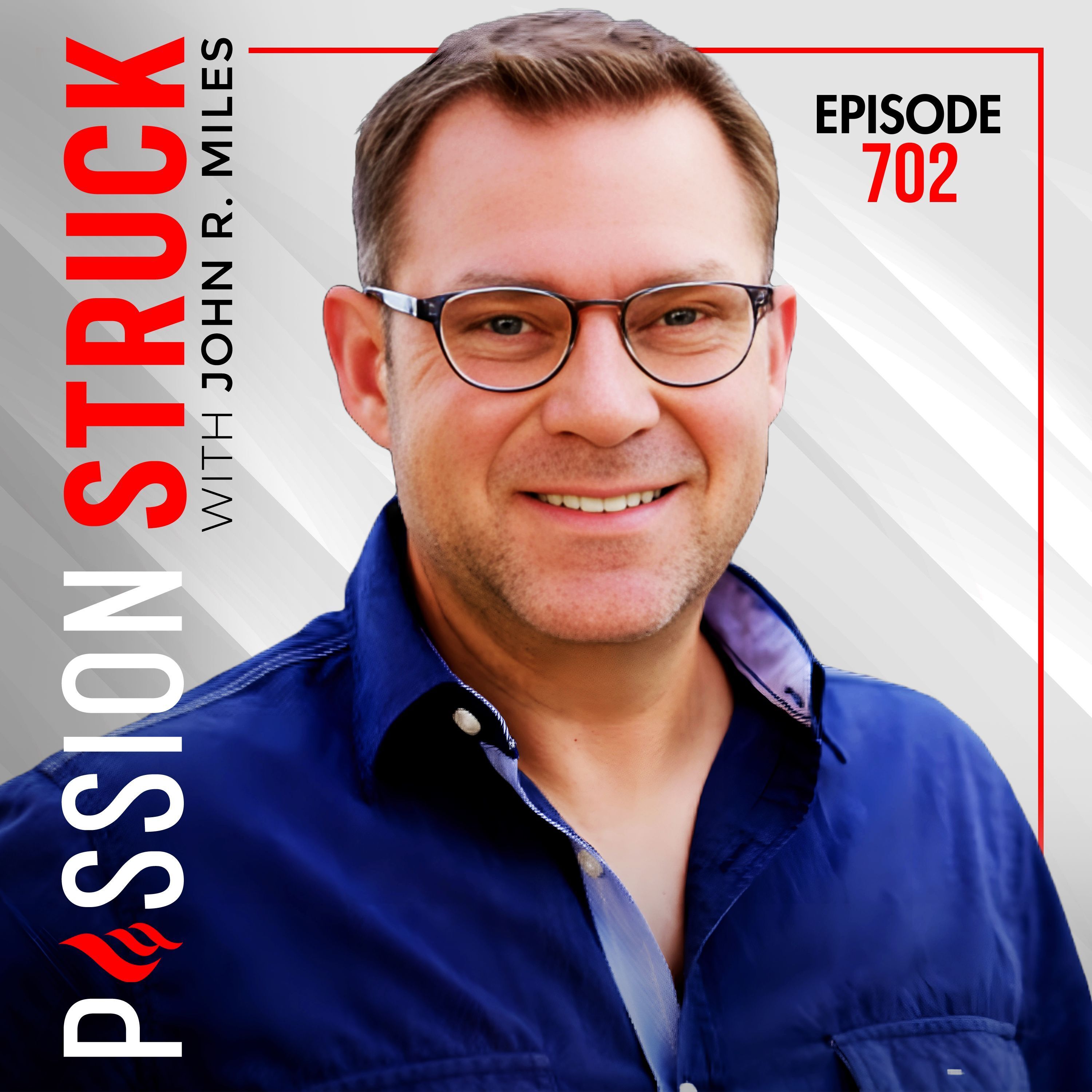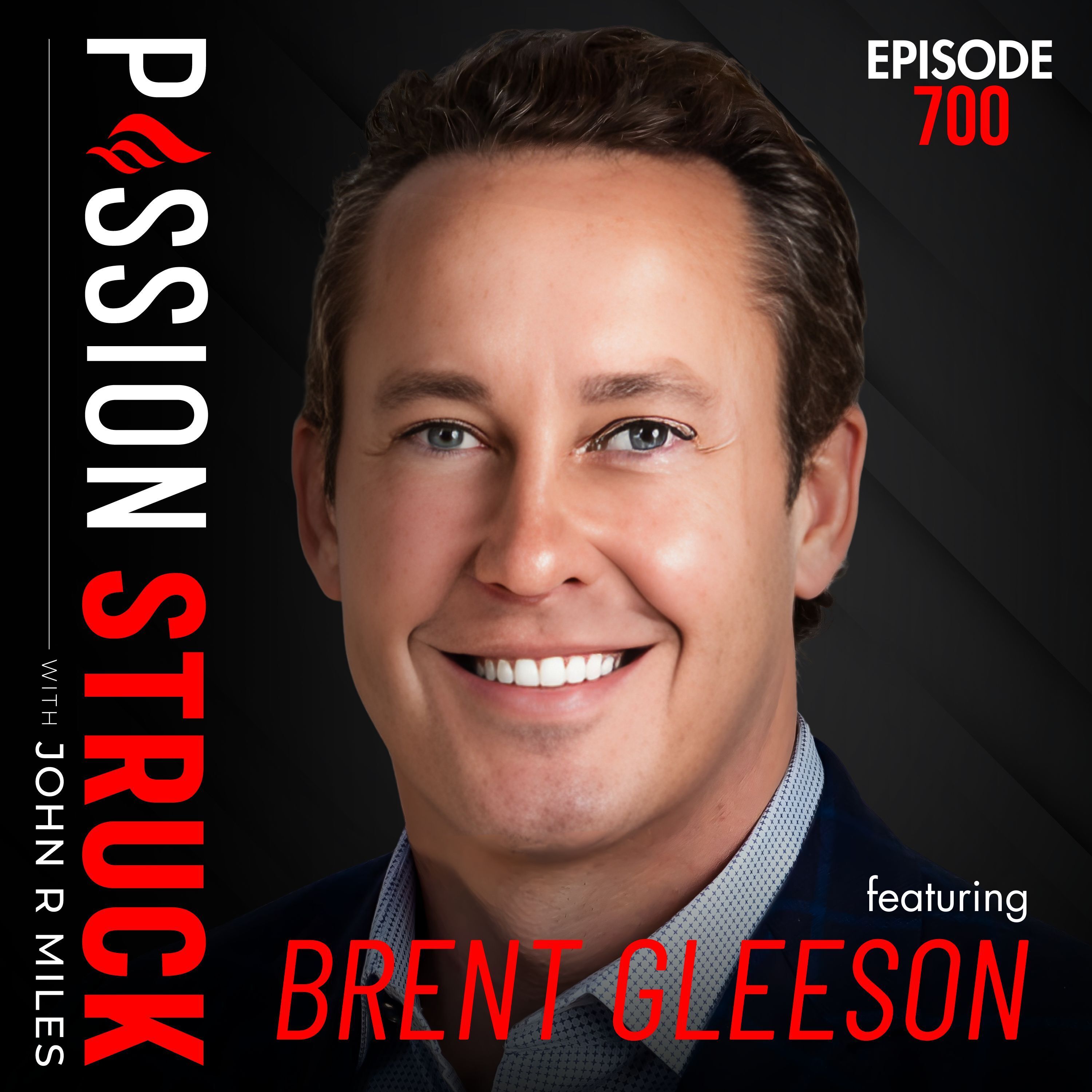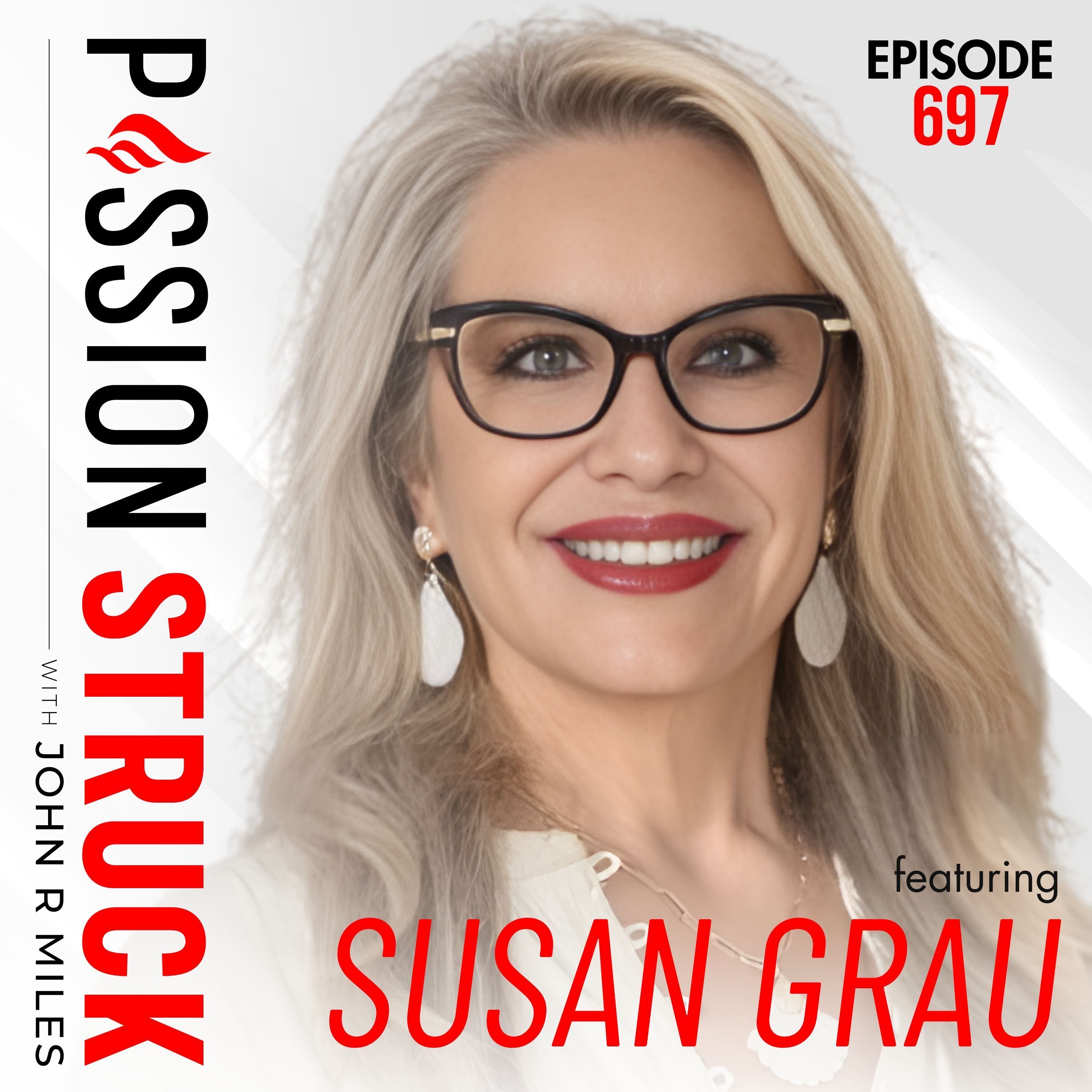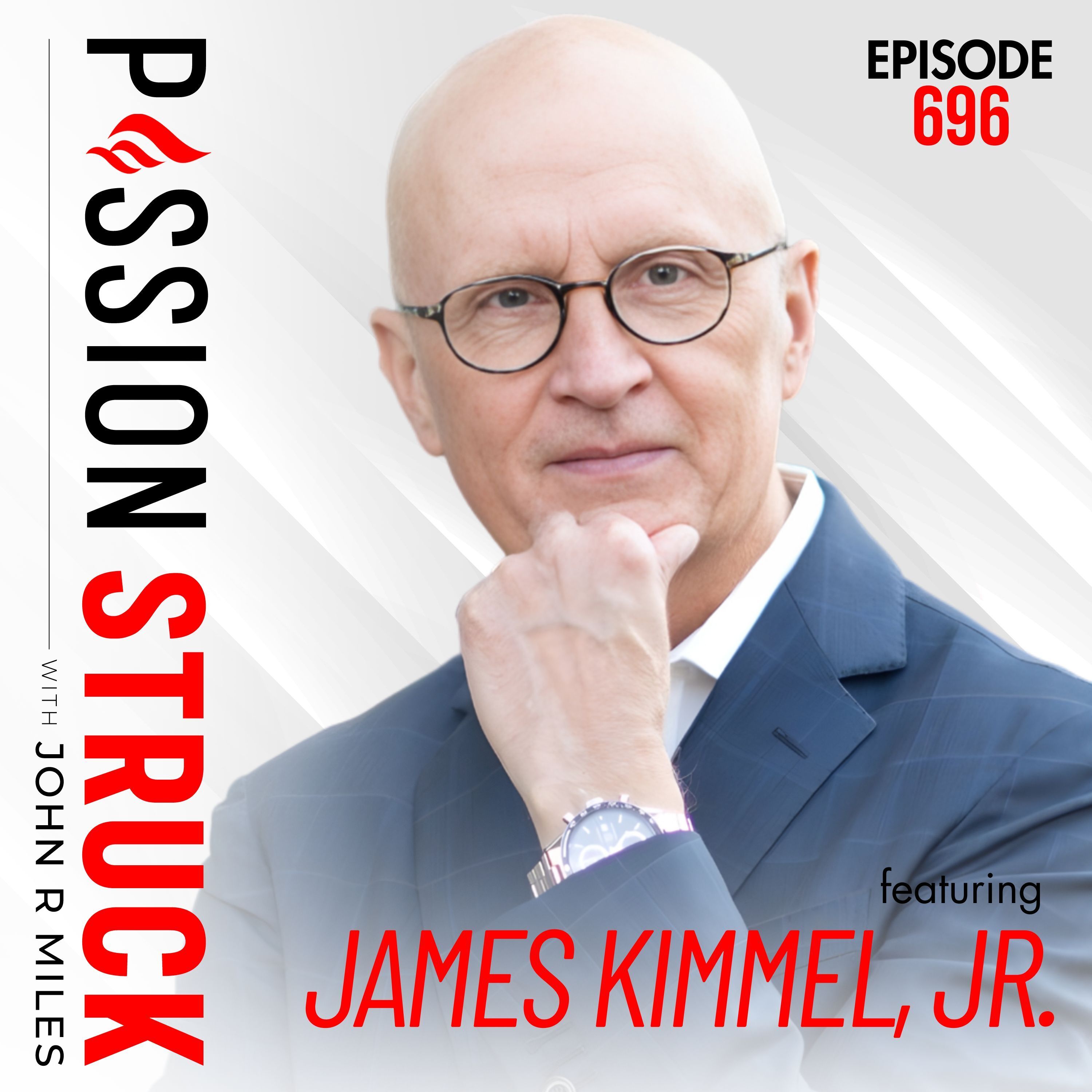Live Like You Mean It: The Compass of Congruent Connection w/ John R. Miles | EP 630
In this powerful close to The Connected Life series, John Miles pays tribute to the late Brian Wilson—co-founder of The Beach Boys—by exploring the theme of congruence: the often invisible alignment between our inner lives and outer expression. Using Wilson’s life as both mirror and message, this episode unpacks how misalignment creates disconnection and how real connection begins with self-trust. You’ll also learn how to apply the Connection Compass—a practical framework to help you stay aligned, grounded, and emotionally present even under pressure.
Click Here for the Full Shownotes
And if that framework sparked something in you—if you're thinking, “This is exactly what I need, but I’m not sure I’ll remember it in the moment…”—I’ve got something for you.
I created a free Connection Compass Guide inside The Ignition Room on Substack.
It’s packed with:
- Real-life language to use when you’re triggered
- Journaling prompts to unpack your reactions
- A printable one-sheet to keep visible—on your desk, fridge, or even in your wallet
If you want to train your nervous system to respond, not just react—
👉 you can grab it now at theignitedlife.net.
How to Connect with John:
- Connect with John on Twitter at @John_RMiles
- Follow him on Instagram at @John_R_Miles
- Subscribe to our main YouTube Channel and to our YouTube Clips Channel
- For more insights and resources, visit John’s website
See Privacy Policy at https://art19.com/privacy and California Privacy Notice at https://art19.com/privacy#do-not-sell-my-info.
Press play and read along
Transcript
Speaker 1 Why choose a sleep number smart bed?
Speaker 3 Can I make my site softer?
Speaker 2 Can I make my site firmer? Can we sleep cooler?
Speaker 1
Sleep number does that, cools up to eight times faster, and lets you choose your ideal comfort on either side. Your sleep number setting.
Enjoy personalized comfort for better sleep night after night.
Speaker 1
It's our Black Friday sale, recharged this season with a bundle of cozy, soothing comfort. Now only $17.99 for our C2 mattress and base, plus free premium delivery.
Prices higher in Alaska and Hawaii.
Speaker 1 Check it out at a sleep number store or sleepnumber.com today.
Speaker 4 This episode is brought to you by Progressive Insurance. Do you ever find yourself playing the budgeting game?
Speaker 4 Well, with a name your price tool from Progressive, you can find options that fit your budget and potentially lower your bills. Try it at progressive.com.
Speaker 4 Progressive casualty insurance company and affiliates. Price and coverage match limited by state law, not available in all states.
Speaker 5 Coming up next on Passion Struck, what makes someone magnetic? Not their words, not their talent, not even their charm.
Speaker 5 The people whom we trust the most, follow the most, feel the most drawn to are the ones whose outside matches their inside. And when it doesn't, we feel it, even if we can't name it.
Speaker 5 This week, we close out the Connected Life series by talking about the final, often invisible layer of deep connection, congruence.
Speaker 5 And to get there, I want to take you inside the life of someone who created some of the most honest, heartfelt music of the last century, while secretly battling some of the deepest disconnection you can imagine.
Speaker 5
Brian Wilson of the Beach Boys wasn't just a musical genius. He was a master of harmony externally.
Internally, though, he was often at war with himself.
Speaker 5 This episode is about that war, the one between your truth and your presentation.
Speaker 5
Because you can't build real connection when you're not being real with yourself. Welcome to Passion Struck.
Hi, I'm your host, John R.
Speaker 5 Miles, and on the show, we decipher the secrets, tips, and guidance of the world's most inspiring people and turn their wisdom into practical advice for you and those around you.
Speaker 5 Our mission is to help you unlock the power of intentionality so that you can become the best version of yourself. If you're new to the show, I offer advice and answer listener questions on Fridays.
Speaker 5 We have long-form interviews the rest of the week with guests ranging from astronauts to authors, CEOs, creators, innovators, scientists, military leaders, visionaries, and athletes.
Speaker 5
Now, let's go out there and become Passion Struck. Welcome back to Passion Struck.
I'm your host, John Miles.
Speaker 5 and you're listening to episode 630, the final solo episode in our series, The Connected Life.
Speaker 5 Over the past few weeks, we've unpacked what it really means to build connection, not just outwardly, but inwardly.
Speaker 5 And if you've been with us, you know this series hasn't been theoretical, it's been practical, personal, and anchored in stories that stick.
Speaker 5 In episode 621, we looked at inner awareness, how your ability to connect with others starts with how deeply you know and lead yourself.
Speaker 5 In 624, we explored emotional matter through the lens of Taylor Swift and how her small, intentional actions create lasting emotional connection with millions of people.
Speaker 5 And in episode 627, I shared one of the hardest conversations that I've had this year, along with the REACT method for staying grounded when your nervous system wants to bolt or blow up.
Speaker 5 We've also been joined during this series by extraordinary guests who've helped us illuminate this journey, including John Kabat-Zinn on Presence as a Radical Act, Dr.
Speaker 5 Anna Lempke on the neuroscience of craving, compulsion, and emotional clarity, Suzanne Giesman on the soul deep side of connection and intuitive intelligence, and today we bring it all home.
Speaker 5 Because at the core of real connection is something most people often overlook. congruence, the invisible alignment between what you say and how you show up.
Speaker 5 When your tone matches your truth, when your values aren't just written down, they're lived, especially under pressure.
Speaker 5 And to bring that all into focus, we're going to reflect on the remarkable and at times heartbreaking story of Brian Wilson of the Beach Boys.
Speaker 5 A musical genius, yes, but also someone who spent decades at war with himself before finding his way back to internal harmony.
Speaker 5 This is the kind of alignment that turns presence into power power and makes trust possible.
Speaker 5 And if you want to go deeper, there's a free companion guide to this episode waiting for you inside the Ignited Life, our sub stack, where the episode ends and the practice begins.
Speaker 5 You can also find this in the show notes at passionstruct.com.
Speaker 5 In the companion guide, you'll find journaling prompts, congruence check-ins, and a printable tool to help you live aligned, not just composed.
Speaker 5 All of that is linked in the show notes or at theignitedlife.net. Now, let's get into this final chapter of The Connected Life.
Speaker 5 Thank you for choosing Passion Struck and choosing me to be your host and guide on your journey to creating an intentional life. Now, let that journey begin.
Speaker 5 If you've followed me for any length of time, you know I'm constantly searching for the breakthroughs that actually make a difference in how we age, feel, and perform.
Speaker 5 Lately, I've been taking timeline Mito Pure Gummies, and I got to tell you, I'm feeling the shift. My energy is more sustained, my focus sharper, and my recovery quicker.
Speaker 5 It's like I upgraded my engine at the cellular level. What makes them stand out?
Speaker 5 They're powered by MitoPure, the only clinically proven form of urolithin-A, a compound that activates your longevity pathways, supports muscle strength, and improves cellular energy.
Speaker 5
It's clean, vegan, and backed by over 15 years of cutting-edge science. Dr.
Mark Hyman calls urolithin-A a game changer for longevity.
Speaker 5 And with MitoPure, everyone can benefit, no matter your gut health. If you want to stay strong and energize now and as you age, then you have to try MitoPure gummies.
Speaker 5
My friends at Timeline are offering 20% off just for my listeners. Head to Timeline.com slash Passionstruck to get started.
That's Timeline.com slash Passionstruck. Yourselves will thank you.
Speaker 7 November is all about gathering. Friends giving feasts, Thanksgiving dinners, and football weekends.
Speaker 7 Total One and More has everything you need for your table and your toasts with thousands of wines, spirits, and beers at the lowest prices.
Speaker 7 From bold reds to sparklers, you'll find the perfect wines to raise a glass this season.
Speaker 7 And when it comes to spirits, Total Wine has you covered from smooth bourbons and tequilas to all the essentials for your holiday cocktails. Hosting Thanksgiving?
Speaker 7 Total Wine's guides make it easy by taking out the guesswork. With the lowest prices for over 30 years, you'll always find what you love and love what you find only at Total Wine and more.
Speaker 7
Curbside pickup and delivery available in most areas. See TotalWine.com for details.
Spirits not sold in Virginia and North Carolina. Drink responsibly.
B21.
Speaker 5
We talk a lot about connection. How to build it.
How to sustain it. how to show up more fully for the people in our lives.
Speaker 5
But we don't talk enough about the invisible thread that holds it all together. Not charisma, not communication, congruence.
The feeling that you get when someone is fully themselves.
Speaker 5
Not polished, not perfect, but integrated. You felt it before.
Maybe it was someone who walked into a room and didn't need to dominate it, but still held your attention.
Speaker 5 Or someone who didn't have the most impressive words, but you believe them because their energy and their message were speaking the same language. That's congruence.
Speaker 5 And congruence is magnetic because the world is full of performance.
Speaker 5 Social masks, well-practiced personas that say the right thing while their eyes, their tone, their posture say something completely else.
Speaker 5 We're bombarded with that type of connection all the time on social media, at work, sometimes even in our own families.
Speaker 5
So when someone shows up in alignment, when what they say matches who they are, it stands out. It's rare.
It's grounding. It's safe.
People don't connect to your words. They connect.
Speaker 5
to your wholeness. When your tone matches your message, when your actions match your values, when who you are inside is visible outside, especially under pressure.
That's congruence in practice.
Speaker 5
And it's not just a philosophical idea. It's felt at the biological level.
Your nervous system, your gut, your brain, your mirror neurons are constantly scanning for safety. It's primal.
Speaker 5
It's protective. You don't need to logically dissect someone's motives to feel if something's off.
You just know. You sense the misalignment.
And your body says something doesn't feel safe here.
Speaker 5
That's what incongruence does. Even if the words are right, the vibe is wrong.
And your body listens to that vibe. Here's the truth.
You can't build meaningful connection.
Speaker 5
on top of internal contradiction. You can try.
You can read all the books, memorize all the tools, learn the scripts. But if who you say you are and who you show up as don't match, people
Speaker 5
will feel it. And eventually, so will you, because misalignment is exhausting.
Performing a version of yourself every day that doesn't quite match with your truth, that's a full-time job.
Speaker 5 And it comes with a cost, anxiety, burnout, disconnection, and the gnawing feeling that you're succeeding on the outside, but slowly eroding on the inside. Congruence isn't about being flawless.
Speaker 5
It's about being honest. It's not about always saying the perfect thing.
It's about letting your voice match your values. even when your voice shakes.
It's not about being nice. It's about being true.
Speaker 5
And that truth isn't always tidy. Sometimes it sounds like setting a boundary.
Sometimes it looks like leaving a room quietly, like I talked about last week, instead of exploding.
Speaker 5 Sometimes it's saying, that didn't feel good, even when you're not sure how it will end. Here's what I've learned personally, painfully, and with practice.
Speaker 5
Congruence doesn't guarantee connection, but without it, connection can't last. Because people don't stay close to who you pretend to be.
They stay close to who you really are.
Speaker 5 And that's the foundation of everything that we've been building in this series. Inner awareness, emotional presence, self-leadership under pressure.
Speaker 5
None of it matters if your outer life and your inner life don't speak. the same truth.
That's why in this final solo episode of this series, I'm bringing it all together.
Speaker 5
Because this whole series, The Connected Life, isn't about becoming someone new. It's about becoming someone you trust.
And congruence is how you get there.
Speaker 5
Here's why congruence is more than just a nice idea. It's how our nervous system recognizes safety.
People don't connect through logic alone.
Speaker 5
They connect through energy, through presence, through the micro signals we can't fake. Your brain has mirror neurons.
Cells that fire not just when you act, but when you observe someone else.
Speaker 5
That's why you flinch when someone else stubs their toe. It's also why you feel someone's off when their words say one thing, but their tone, posture, or timing says another.
Congruence builds trust.
Speaker 5 Incongruence breaks it. Not because people are analyzing you, but because their nervous system is scanning for coherence.
Speaker 5 And when that inner and outer don't match, even if your words are right, something doesn't feel safe. Not consciously, but biologically, emotionally.
Speaker 5
That's what makes congruence the foundation of connection. Not performance, not polish, presence, alignment, integrity.
especially under pressure.
Speaker 5 And today, that message feels especially close to the heart because earlier this month, we lost someone whose life embodied both the beauty and the battle of congruence.
Speaker 5
Brian Wilson, the legendary co-founder of The Beach Boys, passed away on June 11th at the age of 82. His music shaped a generation.
His harmonies touched millions. And behind that sound was a soul.
Speaker 5 constantly seeking alignment between his gift and his grief, his presence and his pain. As we reflect on congruence in this episode, we honor his story, not just as a lesson, but as a tribute.
Speaker 5 If you want to understand the cost and the power of congruence, you don't need a textbook. You just need to listen to Brian Wilson, the genius behind the legendary album, Pet Sounds.
Speaker 5 He wasn't a perfect leader.
Speaker 5 He was deaf in one ear, struggled with what he called stage anxiety, plagued by schizoaffective disorder, and for years over-medicated, isolated, controlled by a doctor who claimed to help but merely erased him.
Speaker 5
But here's the thing. His music was never about being perfect.
It was about being true. During the making of the album Pet Sounds, the one with legendary songs like Wouldn't It Be Nice?
Speaker 5 God Only Knows, and Caroline, No, Brian worked with a lyricist named Tony Asher, a quiet collaborator most people have never heard of.
Speaker 5 But Brian once said, Tony had the ability to put into words what I felt in my heart. And that,
Speaker 5
that was the magic. His melodies matched his melancholy.
His lyrics weren't performance. They were pain, longing, wonder, and truth.
set to music. He didn't wear a mask.
Speaker 5
He made it audible, even when his band didn't understand, even when audiences were unsure, he knew what was real, and he created from that place. That's congruence.
But then he lost it.
Speaker 5
The doctor, the drugs, the silence. He stopped showing up in the studio.
He stopped trusting his voice. He started performing a version of himself that wasn't real.
Speaker 5
And eventually, even that collapsed. That's what incongruence does.
It doesn't just dim your light. It disconnects you from your gift, from your people, from yourself.
Speaker 5 But the story doesn't end there. Years later, Brian broke free, got support, found love, and little by little reclaimed his voice.
Speaker 5 He finished Smile, an album once dismissed as too much, too weird to Brian, and released it on his own terms. He got back on stage, not to impress, not to win, but because it was true.
Speaker 5
That's what congruence is. Not being perfect, but being whole.
Letting your inner truth realign with your outer life, even after years of silence.
Speaker 5
And when asked about that shift, Brian said something that still gives me chills. I'm having more fun now than I ever did as a beach boy, he said, because I'm no longer a beach boy.
I'm Brian Wilson.
Speaker 5 That's the work, becoming someone you trust, not someone you perform. And that's the whole point of this series.
Speaker 5 Brian Wilson's life and passing remind us of just how fragile and how powerful congruence can be. His music was a mirror for his inner harmony.
Speaker 5 His silence, after decades of noise, was its own kind of message.
Speaker 5 And now, as we remember him, not just as an artist, but as a human being, we are invited to ask: where do I need to come back into alignment?
Speaker 5
Because here's the truth: alignment doesn't happen all at once. It happens in micro decisions.
One honest word, one truth told, without needing to wrap it in a bow.
Speaker 5 And in a moment, I'm going to give you a framework, something powerful, something simple and practical to help you realign anytime life pulls you off course.
Speaker 5 But first, if you've been moved by this series or you're looking to help your team with more clarity, connection, and purpose, I'd love to speak at your next event.
Speaker 5 Whether it's a keynote leadership summit or company retreat, I bring these concepts to life in a way that's real, actionable, and built for impact.
Speaker 5 If your organization is navigating change, building a culture or just ready to grow, head to johnrmiles.com/slash speaking or check the link in the show notes.
Speaker 5 Let's make your next event one that actually moves people. Now, a quick word from our sponsor:
Speaker 8
Adobe Acrobat Studio, so brand new. Show me all the things PDFs can do.
Do your work with ease and speed. PDF spaces is all you need.
Do hours of research in an instant.
Speaker 8
Key insights from an AI assistant. Pick a template with a click.
Now your prezo looks super slick. Close that deal.
Yeah, you won. Do that, doing that, did that, done.
Speaker 8
Now you can do that, do that with Acrobat. Now you can do that, do that with the all-new Acrobat.
It's time to do your best work with the all-new Adobe Acrobat Studio.
Speaker 2 Hi, I'm William Googe, a Vuri collaborate and professional ultra runner from the UK. I love to tackle endurance runs around the world, including a 55-day 3064-mile run across the US.
Speaker 2 So I know a thing or two about performance wear. My go-to daily short is the core short from View.
Speaker 2 It's perfect for my daily run in the gym, strength training, or even when I'm taking a day off, relaxing, doing some stretching, and recovering the best way I can.
Speaker 2 Check them out by visiting viewery.com slash William.
Speaker 2 That's V-U-O-R-I dot com slash William, where new customers can receive 20% off their first order, plus enjoy free shipping in the US on orders over $75 and free returns.
Speaker 2 Exclusions apply, visit the website for full terms and conditions.
Speaker 5
Welcome back. Brian Wilson's story isn't just a eulogy.
It's a mirror. A reminder that alignment isn't just a trait.
It's a practice.
Speaker 5 And while we might not all write harmonies or headline stadiums, we all face the same daily question. Am I living in tune with myself or just playing along? That's where the next tool comes in.
Speaker 5
It's what I call the connection compass, a simple but powerful way to find your way back to alignment. These four directions, they don't just point you forward.
They bring you home.
Speaker 5
North is awareness. It's knowing what's real inside you, emotionally, physically, mentally.
This is what I explored in episode 621, where connection begins. by coming home to yourself.
Speaker 5
East is emotional regulation. It's about about responding with presence, not reactivity.
That's what episode 627 was all about.
Speaker 5
And the React method, that lives right here, because it's not the calm that builds trust. It's congruence under pressure.
South is for valuing others.
Speaker 5 It's about how you make people feel seen without the need to perform. Remember episode 624? Taylor Swift, The Art of Mattering? This direction is about noticing, not impressing.
Speaker 5
And West, that's cultural intelligence. It's the ability to see beyond our own lens, to connect across difference with humility.
That's what Michael Morse, Paul Eastwood, and Eli Finkel remind us.
Speaker 5
Connection isn't a one-size-fits-all approach. It's relational.
It's contextual. It's nuanced.
Speaker 5 These four directions don't just help you connect better with others, they bring you back to yourself, to alignment, to integrity, to becoming someone others can trust, because you trust yourself.
Speaker 5
These aren't just ideas. They're invitations to check in, to adjust course, to lead from truth.
And I have had to put all four of these directions into practice in my own life lately.
Speaker 5
Let me be real with you. These past few months have been heavy.
We've been remodeling our new home after the hurricane, and it hasn't exactly gone to plan.
Speaker 5
Last week, I told you all about the standoff that I had with my contractor. But that was just one moment.
What I didn't share is everything I didn't say leading up to it.
Speaker 5
There were so many moments that left me frustrated, unsettled. and on edge.
The work wasn't right. The accountability was shaky.
The tension kept building. But I kept quiet, not because I was scared.
Speaker 5
I was managing pressure. I knew if I pushed too hard, I could blow the whole thing up.
The project might stall. He might walk.
Speaker 5
And with everything already on a tight timeline, I didn't have time to find a plan B. So I held back.
I kept the peace. I kept things moving.
And I told myself, this is leadership.
Speaker 5
This is what it takes. But here's what I didn't see right away.
While I was managing the project, I was losing connection with myself.
Speaker 5
I wasn't speaking the full truth, not to the contractor, not to my wife, not even to myself. I was carrying the load, but pretending I wasn't.
And underneath, the pressure was compounding.
Speaker 5 trying to run the show, grow the company, support my wife through her recovery from spine surgery, keeping this podcast alive, all while managing a house that felt like it was falling apart again and again.
Speaker 5
And in all of that, I started to go quiet inside. That's exactly what incongruence does.
It starts small, a silence here, a deflection there, but over time, it... adds up.
Speaker 5 You start to feel off, disjointed, not because you're lying, but because you're leaving parts of your truth behind. And when you're out of alignment like that, you don't just lose clarity with others.
Speaker 5
You lose clarity with yourself. I learned this the hard way.
You can't lead well from a place of internal disconnection. You can't give your best if you're constantly suppressing what's real.
Speaker 5
So how do you practice congruence? You don't get there by gritting your teeth, forcing a smile, or memorizing better scripts. You get there by realigning.
And for me, that comes down to three anchors.
Speaker 5
The first is self-honesty. What am I actually feeling right now? Am I pretending or telling the truth? This one's simple, but it's not easy.
It requires pause. It requires presence.
Speaker 5 It requires asking, what's real inside me right now? Not what I wish I felt, not what I should feel, but what I actually feel.
Speaker 5
Because you can't align with what you're unwilling to name. The second anchor I call values check.
And it's all about what matters here beyond ego, fear, or approval.
Speaker 5 This is where you get clear, not on what's the loudest, but on what's the deepest. The moment when you ask, what would integrity do, not insecurity.
Speaker 5
It helps you cut through reactivity and re-center on what matters most. And the third anchor is something I call aligned action.
What would it look like to move from that truth even just 10% more?
Speaker 5
Not perfectly, not dramatically, but maybe you say one sentence differently. Maybe you pause before hitting send.
Maybe you speak a quiet no.
Speaker 5 where you used to smile and say sure because every time you align how you feel what you you believe, and what you do, you reclaim a little bit more of your integrity.
Speaker 5 You become someone you trust, and people can feel that, even if they don't have the words for it.
Speaker 5
These three practices are how you move inside the connection compass, how you stay grounded when things get noisy. If you're feeling lost emotionally, start in the north.
Inner awareness.
Speaker 5
Ask what's really going on inside me. What emotion am I avoiding or not naming? If you're in the heat of conflict or stress, head east.
Emotional regulation.
Speaker 5
Use the React method that I talked about in episode 627. Anchor in breath.
Slow down. Respond.
Don't react.
Speaker 5 If you feel distant from others or if you feel like you're performing to be liked, then that is your cue to go south. Valuing others.
Speaker 5 Try small, genuine presence, a name, a note, a pause to really see someone. And if you're clashing with someone who's different from you, that's West, cultural intelligence.
Speaker 5 Ask, am I curious or am I just assuming? How can I connect across this gap? Not control it. Each direction brings something different, but they all lead the same way.
Speaker 5
Back to congruence, back to connection. back to you.
And this is why the React method matters. It's not just a way to stay calm.
It's a way to stay congruent, especially when pressure rises.
Speaker 5
Let's line the React method up for you. Recognize the spike.
That's self-honesty. Excel before engaging.
That's the pause that protects your values. Align with your values.
That's your North Star.
Speaker 5
Choose your response. That's aligned action.
Take time to reflect. That's how you integrate, learn, and grow.
Presence, awareness, integrity. It all comes back to this.
Speaker 5 Not being someone else, not performing a more polished version of you, but practicing daily what it means to be true, even 10% truer than yesterday.
Speaker 5 So if congruence is the soil that real connection grows in, what would it look like to tend to yours?
Speaker 5 This isn't about being perfect. It's about being real, about becoming someone you trust, even in the quiet moments, even in the tension, even when no one else is watching.
Speaker 5
So here's my challenge to you. Step one, name where you feel off.
Where in your life do your insides and outsides not match up? Is it a relationship? Is it your leadership?
Speaker 5
Your voice voice in the room, perhaps? Be honest. Step two, take one micro-choice towards congruence.
Not a leap, just a move.
Speaker 5
What's one thing that you can do to bring your inner truth and your outer expression 10% closer? Say no. Speak up.
Pause before replying, or just name the feeling. even to yourself.
Speaker 5 And then step three, say it out loud to to a partner, a friend, perhaps just write it down in your journal.
Speaker 5 Say this, I am choosing congruence here, even if it's messy, even if it's small, because that is how trust grows. Not all at once, but one real act at a time.
Speaker 5 And if you're not sure where to begin, start with the compass. Ask yourself what direction feels most out of sync right now.
Speaker 5 Is it self-awareness, emotional presence, valuing others, seeing a cross-difference? Then take one step in that direction.
Speaker 5 That wraps up our journey through the Connected Life, a series about presence, emotional awareness, and building trust in a noisy world.
Speaker 5 And I hope what you're walking away with isn't just a set of rules, but a deeper relationship with yourself. because connection doesn't start out there, it starts in here.
Speaker 5 And if you're ready to go deeper, go to theignitedlife.net or check the show notes.
Speaker 5 You'll find the Congruence Check-In Toolkit, a free guide with prompts, the three anchors framework, and reflection questions to help you navigate today's episode.
Speaker 5
And if this series helped you see yourself and how you connect with others differently, share it. Leave a review.
Send it to someone you care about. We grow in community.
Speaker 5
We grow by practicing out loud. And we grow by continuing the work, even when no one's watching.
Next week, we turn the page.
Speaker 5 We're launching a brand new series for July titled The Power to Change, a month-long dive into how real transformation happens in our thoughts, our behaviors, and our emotions. We kick it off with Dr.
Speaker 5 Bob Rosen, a global CEO whisperer, psychologist, and New York Times best-selling author to unpack the science behind why change is so hard and how to actually make it stick.
Speaker 6
Detached does not mean disengaged or disconnected. Quite the opposite.
It means that you get rid of the stuff
Speaker 6 that is holding you back and holding you down, the baggage, and it frees up energy.
Speaker 6 to focus on the things that matter, whether it's our health and well-being or our communities or democracy or the environment, wherever you stand politically, it frees you up for energy.
Speaker 5 I'll see you next week. And until then, be real, be rooted, be someone you trust, and live life passion-struck.
Speaker 9 Your global campaign just launched.
Speaker 2 But wait, the logo's cropped.
Speaker 9 The colors are off. And did Legal clear that image? When teams create without guardrails, mistakes slip through.
Speaker 3 But not with Adobe Express, the quick and easy app to create on-brand content. Brand kits and lock templates make following design guidelines a no-brainer for HR sales and marketing teams.
Speaker 3 And commercially safe AI, powered by Firefly, lets them create confidently so your brand always shows up polished, protected, and consistent everywhere. Learn more at adobe.com slash go slash express.
Speaker 10 At Grocery Outlet, we're turning up the cheer with your chance to win free groceries for a year. That's $6,000 in Grocery Outlet gift cards.
Speaker 10
From October through December, one lucky winner will score the grand prize each month. Plus, four more monthly winners get a $500 gift card.
Make your holiday shopping pay off.
Speaker 10
Download the Grocery Outlet app and scan your wow card every time you shop for your chance to win free groceries for a year. No purchase necessary, one entry per day.
Restrictions apply.
Speaker 10 Visit groceryoutlet.com for details.
Speaker 8 Grocery Outlet Bargain Market.
